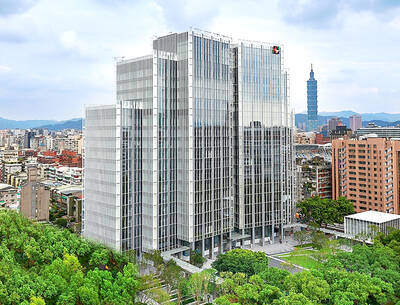The Ministry of Finance yesterday unveiled a medium and long-term financial improvement program that aims to reduce government outlays and generate tax revenues worth NT$1 trillion (US$30.9 billion) over eight years.
The program, including 10 major measures, is expected to raise tax revenues by NT$355 billion, cut expenditures by NT$295 billion and generate an extra NT$360 billion in income through better management of national assets, Minister of Finance Lee Sush-der (李述德) told a media briefing.
“If all proceeds smoothly, the program may yield an average of NT$125 billion a year between 2009 and 2016,” Lee said. “The estimate has yet to factor in potential economic growth and the multiplier effect.”
Lee conceded the nation’s finances are deteriorating with government debt hitting NT$3.88 trillion last month — 32.21 percent of GDP. The figure is expected to climb closer to the 40 percent ceiling next year as the government has to borrow more to rebuild areas hit by Typhoon Morakot.
“Government debt rose by NT$222.5 billion between May last year and this year,” Lee said, adding that the budgetary shortfall this year is estimated at between NT$140 billion and NT$150 billion on slumping tax revenues.
To improve the situation, the ministry plans to set the tax burden at 14.3 percent of GDP, national land utilization rates for non-public use at upward of 50 percent and debt principal reduction at more than 5 percent of yearly tax revenues.
“The nation’s tax burden, which sank to a record low of 11.9 percent in both 2002 and 2003, is relatively low compared with Japan, South Korea and the United States” where the burden exceeds 20 percent, Lee said.
Further, the minister said he intended to hike business taxes from the current 5 percent to 6 percent in 2013. The planned tax hike does not require approval from the legislature.
Lee said he would seek to release shares in national enterprises and companies with a government stake although previous attempts met with resistance from lawmakers and union workers.
“I think inadequate communication and transparency rendered past efforts controversial,” the minister said. “I will try to avoid that.”
The government controls more than 88 billion shares in different companies with an aggregate value of about NT$2.93 trillion in different firms, the ministry’s data showed. With better management, those shares can generate NT$167 billion while national assets can bring in another NT$189.5 billion, Lee said.
On cutting expenses, the minister said he would advise the Ministry of Foreign Affairs to buy properties rather than rent representative offices abroad.
Lee said there were many other measures that could be taken to improve the state coffers if all government agencies joined the effort.

GROWING CONCERN: Some senior Trump administration officials opposed the UAE expansion over fears that another TSMC project could jeopardize its US investment Taiwan Semiconductor Manufacturing Co (TSMC, 台積電) is evaluating building an advanced production facility in the United Arab Emirates (UAE) and has discussed the possibility with officials in US President Donald Trump’s administration, people familiar with the matter said, in a potentially major bet on the Middle East that would only come to fruition with Washington’s approval. The company has had multiple meetings in the past few months with US Special Envoy to the Middle East Steve Witkoff and officials from MGX, an influential investment vehicle overseen by the UAE president’s brother, the people said. The conversations are a continuation of talks that

Alchip Technologies Ltd (世芯), an application-specific integrated circuit (ASIC) designer specializing in artificial-intelligence (AI) chips, yesterday said that small-volume production of 3-nanometer (nm) chips for a key customer is on track to start by the end of this year, dismissing speculation about delays in producing advanced chips. As Alchip is transitioning from 7-nanometer and 5-nanometer process technology to 3 nanometers, investors and shareholders have been closely monitoring whether the company is navigating through such transition smoothly. “We are proceeding well in [building] this generation [of chips]. It appears to me that no revision will be required. We have achieved success in designing

UNCERTAINTY: Investors remain worried that trade negotiations with Washington could go poorly, given Trump’s inconsistency on tariffs in his second term, experts said The consumer confidence index this month fell for a ninth consecutive month to its lowest level in 13 months, as global trade uncertainties and tariff risks cloud Taiwan’s economic outlook, a survey released yesterday by National Central University found. The biggest decline came from the timing for stock investments, which plunged 11.82 points to 26.82, underscoring bleak investor confidence, it said. “Although the TAIEX reclaimed the 21,000-point mark after the US and China agreed to bury the hatchet for 90 days, investors remain worried that the situation would turn sour later,” said Dachrahn Wu (吳大任), director of the university’s Research Center for

PROJECTION: KGI Financial said that based on its foreign exchange exposure, a NT$0.1 increase in the New Taiwan dollar would negatively impact it by about NT$1.7 billion KGI Financial Holding Co (凱基金控) yesterday said its life insurance arm has increased hedging and adopted other moves to curb the impact of the local currency’s appreciation on its profitability. “It is difficult to accurately depict the hedging costs, which might vary from 7 percent to 40 percent in a single day,” KGI Life Insurance Co (凱基人壽) told an investors’ conference in Taipei. KGI Life, which underpinned 66 percent of the group’s total net income last year, has elevated hedging to 55 to 60 percent, while using a basket of currencies to manage currency volatility, the insurer said. As different